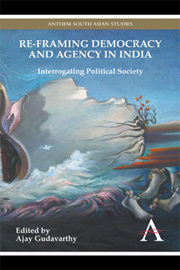Book contents
- Frontmatter
- Contents
- Preface and Acknowledgements
- List of Tables
- Chapter 1 Introduction: Why Interrogate Political Society?
- Part I Political Society and Protest Politics
- Part II Political Society, Middlemen and Mobility
- Part III Civil Society and/or Political Society
- Chapter 10 Clubbing Together: Village Clubs, Local NGOs and the Mediations of Political Society
- Chapter 11 Civic Anxieties and Dalit Democratic Culture: Balmikis in Delhi
- Chapter 12 The Habits of the Political Heart: Recovering Politics from Governmentality
- Chapter 13 Civil Society in the East and Some Dark Thoughts about the Prospects of Political Society
- Part IV Rejoinder
- List of Contributors
Chapter 11 - Civic Anxieties and Dalit Democratic Culture: Balmikis in Delhi
from Part III - Civil Society and/or Political Society
Published online by Cambridge University Press: 05 June 2012
- Frontmatter
- Contents
- Preface and Acknowledgements
- List of Tables
- Chapter 1 Introduction: Why Interrogate Political Society?
- Part I Political Society and Protest Politics
- Part II Political Society, Middlemen and Mobility
- Part III Civil Society and/or Political Society
- Chapter 10 Clubbing Together: Village Clubs, Local NGOs and the Mediations of Political Society
- Chapter 11 Civic Anxieties and Dalit Democratic Culture: Balmikis in Delhi
- Chapter 12 The Habits of the Political Heart: Recovering Politics from Governmentality
- Chapter 13 Civil Society in the East and Some Dark Thoughts about the Prospects of Political Society
- Part IV Rejoinder
- List of Contributors
Summary
Introduction
In a series of essays and a book, Partha Chatterjee has offered a new term for describing, as he puts it, ‘popular politics in most of the world’ (Chatterjee 2004). In order to account for what he deems to be the differences between the First World and Third World democracies, he argues that a fourth category must be added to the conventional tripartite division between the state, civil society and family: the category of ‘political society’. The latter term is designed to adjust the concept of ‘civil society’ to conditions of post-colonial governmentality (Chatterjee 2001, 37). Chatterjee's intervention has spurred much productive debate and discussion among students of development and democracy, and should be applauded for helping us rethink political theory and political anthropology in the twenty-first century. I, however, will argue that the basic proposition underlying his argument is false.
The essential problem with Chatterjee's argument is that he takes what ought to be treated as normative categories – the family, civil society, and the state – and treats them as descriptive categories. In so doing, he reifies the very categories he is critiquing, and fails to recognize them as institutions that people sometimes do and sometimes do not fetishize in their own day-to-day practices. By drawing on ethnographic examples of Balmiki politics in Delhi and street hawker protests in Mumbai, the paper points to the theoretical problems posed by Chatterjee's attempt to conceptualize political society as a demographically and institutionally separate sphere that is outside of civil society.
- Type
- Chapter
- Information
- Re-framing Democracy and Agency in IndiaInterrogating Political Society, pp. 253 - 268Publisher: Anthem PressPrint publication year: 2012



